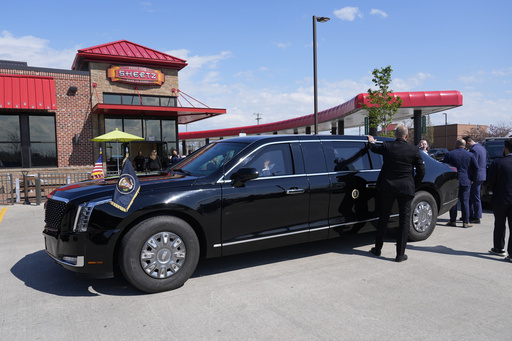The Sheetz convenience store chain has been hit with a lawsuit by federal officials who allege the company discriminated against minority job applicants.
Sheetz Inc., which operates more than 700 stores in six states, discriminated against Black, Native American and multiracial job seekers by automatically weeding out applicants whom the company deemed to have failed a criminal background check, according to U.S. officials.
President Joe Biden stopped by a Sheetz for snacks this week while campaigning in Pennsylvania.
The Equal Employment Opportunity Commission filed suit in Baltimore against Altoona, Pennsylvania-based Sheetz and two subsidary companies, alleging the chain’s longstanding hiring practices have a disproportionate impact on minority applicants and thus run afoul of federal civil rights law.
Sheetz said Thursday that it “does not tolerate discrimination of any kind.”
“Diversity and inclusion are essential parts of who we are. We take these allegations seriously. We have attempted to work with the EEOC for nearly eight years to find common ground and resolve this dispute,” company spokesperson Nick Ruffner said in a statement.
The privately held, family-run company has more than 23,000 employees and operates convenience stores and gas stations in Pennsylvania, West Virginia, Virginia, Maryland, Ohio and North Carolina.
The lawsuit was filed in federal court on Wednesday, the day Biden stopped at a Sheetz market on a western Pennsylvania campaign swing, buying snacks, posing for photos and chatting up patrons and employees.
Federal officials said they do not allege Sheetz was motivated by racial animus, but take issue with the way the chain uses criminal background checks to screen job seekers. The company was sued under Title VII of the Civil Rights Act of 1964, which prohibits workplace discrimination on the basis of race, sex, religion and national origin.
“Federal law mandates that employment practices causing a disparate impact because of race or other protected classifications must be shown by the employer to be necessary to ensure the safe and efficient performance of the particular jobs at issue,” EEOC attorney Debra M. Lawrence said in a statement.
“Even when such necessity is proven, the practice remains unlawful if there is an alternative practice available that is comparably effective in achieving the employer’s goals but causes less discriminatory effect,” Lawrence said.
It wasn’t immediately clear how many job applicants have been affected, but the agency said Sheetz’s unlawful hiring practices date to at least 2015.
The EEOC, an independent agency that enforces federal laws against workplace discrimination, is seeking to force Sheetz to offer jobs to applicants who were unlawfully denied employment and to provide back pay, retroactive seniority and other benefits.
The EEOC began its probe of the convenience store chain after two job applicants filed complaints alleging employment discrimination.
The agency found that Black job applicants were deemed to have failed the company’s criminal history screening and were denied employment at a rate of 14.5%, while multiracial job seekers were turned away 13.5% of the time and Native Americans were denied at a rate of 13%.
By contrast, fewer than 8% of white applicants were refused employment because of a failed criminal background check, the EEOC’s lawsuit said.
The EEOC notified Sheetz in 2022 that it was likely violating civil rights law, but the agency said its efforts to mediate a settlement failed, prompting this week’s lawsuit.
